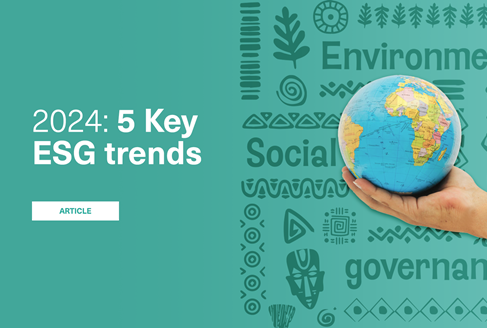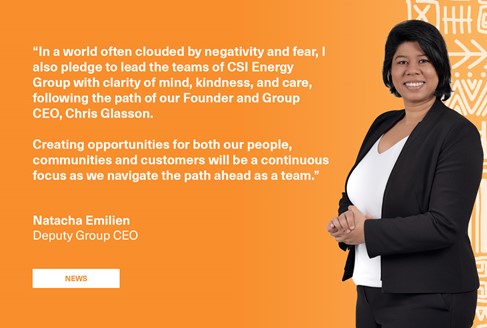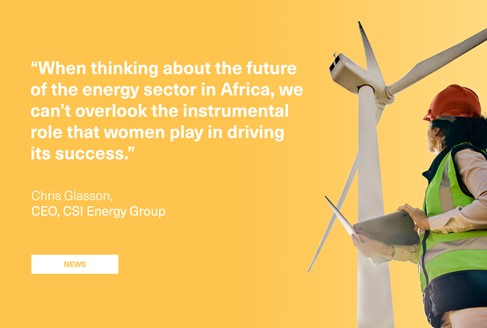What Happens When We Ask Men the Questions Usually Reserved for Women?
In the professional world, particularly in sectors like ours, which are traditionally male-dominated, there is a noticeable trend in the way women are addressed. Questions about personal routines, work-life balance, and self-confidence are frequently posed to women but seldom to men. This disparity is not just a matter of curiosity; it reflects deep-seated biases that can hinder progress towards true inclusivity.
Why should women be the only ones to justify their presence and performance in the workplace? The assumption that their personal lives have a greater impact on their professional capabilities than their male counterparts is outdated and unfair. It's time for a change.
At CSI Energy Group, we envision a future where conversations in the energy sector are free from gender bias. We believe that by asking the same questions of men as we do of women, we can start to break down the barriers that have historically separated us. This approach not only casts a spotlight on the double standard but also fosters a more empathetic and inclusive dialogue that acknowledges the shared challenges we all face.
To put this into practice, we conducted a quick interview with five men in our organization, asking them the same questions often directed at women. Their initial reactions were a mix of surprise and contemplation, as these were not the typical questions they were accustomed to answering in a professional setting. After a few seconds of reflection, here's what they had to say:
As a father working in a demanding industry, how do you manage your responsibilities at work with your role as a parent? Can you share some challenges you've faced and how you've overcome them?
Irfan Lodhi, Regional Operations Manager
That's a very interesting question. Balancing work and parenting is indeed challenging. For instance, coordinating school drop-offs with office timings can be tricky. I've found that living closer to the school and coordinating with my spouse can help manage the timing. Similarly, attending school events while having important work meetings requires careful planning and sometimes compromise. Traveling for work, like my recent trip to Kenya, can also mean missing family events, but I try to be there for the important moments. Even unexpected situations, like my child getting injured while I was in a meeting, test my ability to balance my professional and personal responsibilities. Lastly, managing household emergencies, like running out of gas while hosting guests, requires quick thinking and flexibility. Overall, the company's flexibility plays a crucial role in overcoming these challenges, allowing for a balance between work and personal life.
Emotional intelligence is increasingly recognized as crucial in leadership. How do you incorporate empathy and emotional understanding into your management style, especially in a traditionally 'tough' industry?
Mutalemwa Kalangari, Commercial Supervisor.
Incorporating emotional intelligence into my day-to-day activities has been transformative. Recognizing that emotional intelligence is not just about understanding emotions but also about empathy, I've adopted several traditional but effective approaches. Active listening is key; it allows me to truly hear and understand my team's perspectives. Leading by example rather than just words helps build trust and respect. I also value diverse ideas and encourage open communication, ensuring that everyone feels heard and respected. By blending emotional intelligence with these time-tested methods, I aim to create a more inclusive and supportive work environment, even in an industry known for its toughness.
How do you maintain a healthy work-life balance, especially in an industry that can be all-consuming? What are your strategies for ensuring you have quality time for yourself and your family?
Bhasker Emandi, Electrical Superintendent
Very good question! Balancing work and personal life is indeed crucial, and I approach it with a blend of planning and mindfulness. My strategy involves organizing my work in advance; I allocate time each day or week to prioritize tasks and outline my schedule in my work diary. This foresight helps me manage my professional responsibilities efficiently. Additionally, my spiritual practices play a significant role in maintaining calmness and peace, even in a demanding industry. Communication is key—I make it a point to discuss my work with my family, helping them understand my commitments while also ensuring that I'm attentive to their needs. Every morning, we share our experiences and concerns, which keeps us connected. Outside of work hours, I dedicate myself fully to my family, ensuring that work discussions are reserved for emergencies. This balance is made possible by the understanding and support of my family, for which I am truly grateful
Men in leadership roles often face high expectations. Have you ever experienced impostor syndrome, and if so, how do you cope with it? What advice would you give to other men who might feel the same way?
Stephane Lamvohee, Group Marketing & Communication Manager
Certainly, the pressure of high expectations in leadership can be daunting, especially when you're perceived as younger compared to more experienced professionals in the industry. This perception of youth is often equated with a lack of experience, which can intensify the feeling of being an impostor. In the technical and complex world of the energy industry, there's an added layer of expectation to possess deep knowledge, which can make you feel like others must know better than you. Coping with these feelings involves acknowledging them and then actively working to build confidence in your abilities. I remind myself of the unique perspectives and fresh ideas that come with being younger in the industry. I also seek mentorship and continually invest in learning to bridge any knowledge gaps. For other men facing similar challenges, my advice is to embrace your unique strengths, seek support when needed, and remember that everyone has something valuable to contribute, regardless of age or experience level.
Digging deeper: The purpose behind the questions
The feedback from our colleagues on this initiative has been encouraging, underscoring the value of such reflective exercises. Many shared that the experience was unexpectedly revealing, prompting them to consider aspects of their work-life balance they had not previously articulated. "These were interesting questions that I hadn’t really thought about before," remarked one team member. Another noted that the exercise prompted a different kind of introspection, which was both unusual and valuable. This initiative has subtly shifted perspectives, highlighting the importance of mindful questioning and the role it plays in nurturing an inclusive work environment. The thoughtful responses and the introspective nature of the dialogue have been testaments to the exercise's impact, emphasizing the need for continued efforts in this direction.
The exercise of asking men these questions serves several strategic purposes:
Challenging gender norms: It confronts traditional gender norms and stereotypes head-on. By flipping the script, we encourage a broader, more inclusive perspective on what is considered 'normal' or 'expected' for each gender in the workplace.
Promoting equality: This initiative underscores the importance of equality in inquiry. By subjecting men and women to the same line of questioning, we advocate for an environment where everyone is equally accountable for their work-life balance, emotional well-being, and personal routines.
Encouraging empathy: Having men answer questions typically reserved for women fosters empathy and understanding. It prompts men to consider the unique challenges faced by their female colleagues, thereby cultivating a more supportive and inclusive work culture.
Highlighting double standards: This small exercise brings to light the double standards prevalent in interview questions and workplace expectations. By exposing these disparities, we initiate a dialogue aimed at transforming these outdated norms to foster a more inclusive environment.
Sparking conversation: This approach ignites conversations about gender roles, expectations, and inclusion in the workplace. It encourages individuals to critically examine their own biases and consider how they can contribute to a more inclusive culture.
Empowering change: Aligned with the theme "Inspire Inclusion," this initiative empowers our colleagues to take proactive steps toward creating a workplace where everyone, irrespective of gender, is valued and respected for their contributions.
As we celebrate International Women's Day, with this year's theme being "Inspire Inclusion," we are reminded of the importance of challenging stereotypes and promoting equality. We are proud to be part of the movement towards a more equitable and diverse energy sector, where every individual is valued for their contributions, regardless of gender.
Let's continue to inspire inclusion and strive for a business environment where questions are asked based on relevance and insight, not gender.



